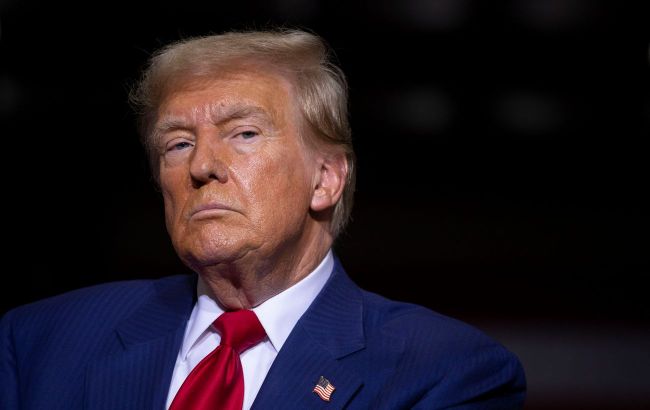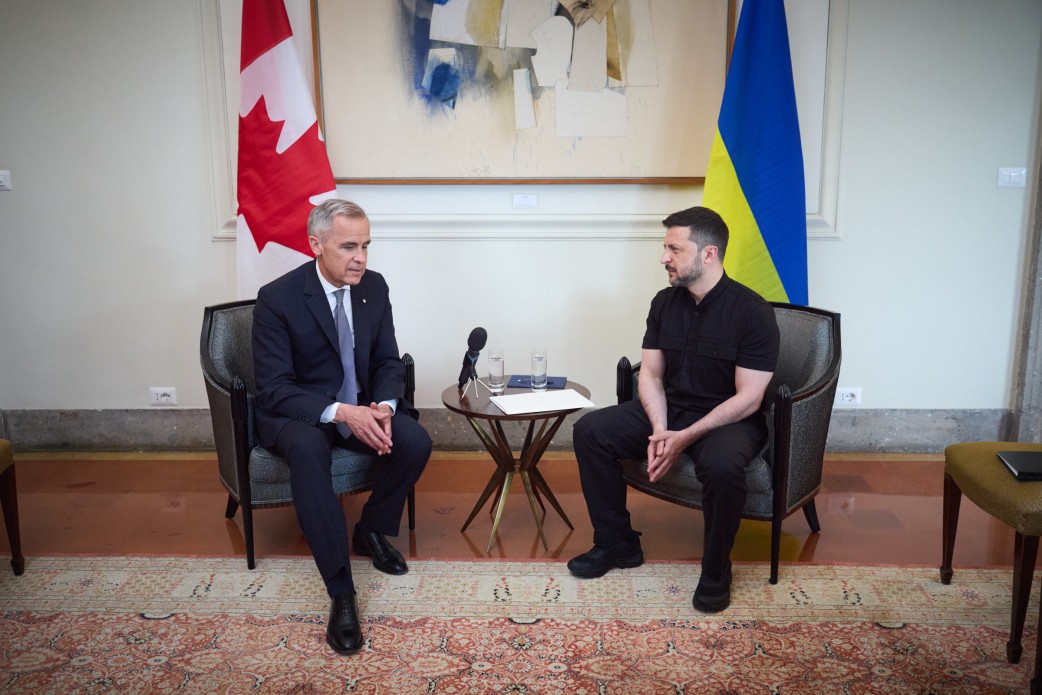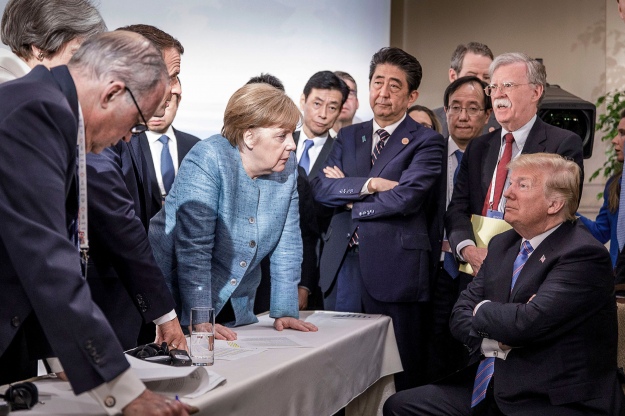G7 takes on Trump: What Ukraine can expect from summit in Canada
 Photo: Donald Trump (Getty Images)
Photo: Donald Trump (Getty Images)
The G7 leaders' summit kicks off in Canada today, June 15, with Ukrainian President Volodymyr Zelenskyy also participating.
RBC-Ukraine breaks down the main topics and expectations surrounding the summit, especially the anticipated face-to-face between Zelenskyy and Donald Trump.
Key questions
- Why are most G7 countries frustrated with the US?
- How is Canada's Prime Minister trying to mediate between the US and Europe?
- What will be crucial in the Zelenskyy-Trump meeting?
The G7 summit in Canada comes at a critical time for Ukraine. On one hand, US President Donald Trump's attempt to bring Russia’s war against Ukraine to an end has essentially collapsed, and he seems increasingly eager to distance himself from the issue.
On the other hand, the remaining G7 members – the UK, France, Italy, Germany, Canada, and Japan – continue to support Ukraine, though they lack the boldness for decisive action. A telling example is the stalled plan to send a European military contingent to Ukraine – a proposal actively discussed earlier this year, with technical preparations underway. Now, that momentum has noticeably faded.
"Europe still hasn't decided whether it's fully with Ukraine if America isn't,” Zelenskyy told journalists ahead of the summit.
Meanwhile, global developments are adding pressure. Just before the G7 summit, tensions flared in the Middle East – Israel launched attacks on Iran’s nuclear and military facilities, prompting retaliatory strikes. The escalating conflict poses a threat to global oil markets and adds complexity to Trump's entangled positions on both Ukraine and Iran.
Trump's trade war also continues. While some deals have been struck, the EU and Japan are still negotiating tariff issues with the US. Washington has delayed the implementation of 50% tariffs on European goods until July 9. According to the Financial Times, Brussels fears that Trump may demand a "good trade deal" for continued US support for Ukraine.
Currently, there's no real consensus with Trump. Bloomberg sources say there won’t be a joint G7 communique; instead, leaders are expected to issue separate statements on various topics.
This approach is part of an effort to reduce friction with Trump, spearheaded by summit host Canadian Prime Minister Mark Carney. That's in line with his governing style, says Anna Lachykhina, partner at Good Politics and a former adviser in the Canadian Parliament.
"Carney's leadership style differs somewhat from former PM Justin Trudeau. He's been working on Ukraine behind the scenes, applying pressure, seeking common ground with partners – and hopes to continue doing so during this summit," Lachykhina told RBC-Ukraine.
She believes Carney could become a key mediator between Trump and European leaders.
Ukraine and the G7: What's on the agenda?
As this year's G7 president, Canada has helped shape the summit's priorities. Carney included "a just and lasting peace in Ukraine" among the central goals.
"We haven't heard many explicit statements yet, but it's known that Carney has emphasized to his party that Ukraine must remain a top priority. Zelenskyy's invitation to the summit clearly reflects that," Lachykhina said.

Volodymyr Zelenskyy and Mark Carney (Photo: Getty Images)
President Zelenskyy’s key goals for the summit include progress in peace talks, stronger sanctions, and continued aid to Ukraine.
"We're close to important sanctions decisions. Dialogue is the only way to find common ground on measures that could cut off Putin's ability to finance this war," Zelenskyy said.
Ukraine's postwar recovery will also be discussed.
A key aspect in the context of pressuring Russia remains lowering the price cap on Russian oil. Back in December 2022, the G7, the European Union, and Australia set this cap at $60 per barrel. The logic behind it was to force Russia to sell its oil at below-market prices, thereby reducing its revenue for waging war. At the same time, the price cap was meant to prevent a sharp drop in global oil supplies. A contributing factor has been the global trend of declining oil prices, which renders the price cap increasingly meaningless (although developments in the Middle East could reverse this trend).
In practice, the $60 cap has proven insufficient. On May 20, Ukraine’s Deputy Foreign Minister Andrii Sybiha urged the G7 to lower the price cap to $30 per barrel. However, it's unlikely the Group of Seven will agree to such a drastic reduction.
On May 19, Reuters reported that the EU will propose lowering the cap to $50 per barrel. The UK also called for a reduction. However, Bloomberg sources say the US opposes lowering the cap. According to their sources, the decision ultimately rests with Trump. But so far, there’s been no shift in the US position, which was outlined at the G7 finance ministers’ meeting earlier this year.
There are many reasons for this resistance — both economic and political. Trump’s reluctance to impose sanctions or apply pressure on Russia is well known. In the worst-case scenario, the EU and UK could impose a lower cap on their own. But without US involvement, its effectiveness would be limited — especially since Russia has learned to circumvent the restrictions using a shadow fleet of tankers. The ability to sanction those who violate the cap is crucial, and Europe alone cannot fully enforce it.
Zelenskyy-Trump meeting
At the summit, a series of meetings between Ukrainian President Volodymyr Zelenskyy and his counterparts is expected. The most crucial is with Donald Trump. Zelenskyy has already outlined some of the topics he plans to raise, with the key issue being Trump’s stance on new sanctions against Russia. While the US president continues to resist imposing them, the Senate has a powerful bipartisan sanctions bill — the Sanctioning Russia Act. Although there are enough votes to pass it, lawmakers still need a final green light from Trump.
"I hope that even if the decision (on sanctions - Ed.) hasn't been made by then, I will at least be able to gauge how close we are to it," Zelenskyy said on June 12.
Given Trump's sharp decline in interest in ending the Russia–Ukraine war, Kyiv is now focusing on two key priorities.
First — maintaining intelligence-sharing with the United States. According to Politico, around 80% of Ukraine's intelligence comes from foreign sources, primarily the US, including radar data, satellite imagery, and early warnings of Russian air or missile strikes. In March, the US temporarily suspended intel sharing for several days — a move that had serious negative consequences for Ukraine.
Here, there's a silver lining. According to Foreign Policy, while the Trump administration may cut direct military aid to Ukraine, intelligence sharing is expected to remain a core part of support. It is relatively inexpensive and allows the US to retain influence over the conflict without direct involvement.
Second — securing Trump’s approval for the purchase of American weapons for Ukraine. Kyiv lacks the funds for such purchases, but European countries could potentially step in and cover the costs.
For now, Ukraine is still receiving weapons allocated during the final months of Joe Biden’s presidency. The last shipments are expected to arrive in the second half of July. After that, there are no serious discussions about further free aid. Meanwhile, Europe remains unable to fully replace the US, though weapons production is gradually increasing. The priority is air defense — notably, German Defense Minister Boris Pistorius has said his country is ready to purchase new Patriot systems for Ukraine.

G7 leaders at the 2018 summit (Photo: Getty Images)
This approach could also appeal to Trump's transactional nature. However, his reluctance to provoke Vladimir Putin remains a major obstacle. The situation in the Middle East and the need to supply arms to Israel may also factor into Trump’s decision-making.
"We already have a package of weapons that we want to purchase from the American side. This is something that can only be negotiated at the presidential level," Zelenskyy said ahead of the summit.
This G7 summit will mark one of Ukraine's most determined efforts — backed by all G7 members except the US — to push Trump toward taking stronger action against Russia. Their previous face-to-face meeting in the Vatican helped put past scandals behind them. This upcoming encounter may be the next step forward — or at least that’s the hope in Kyiv's government offices.

